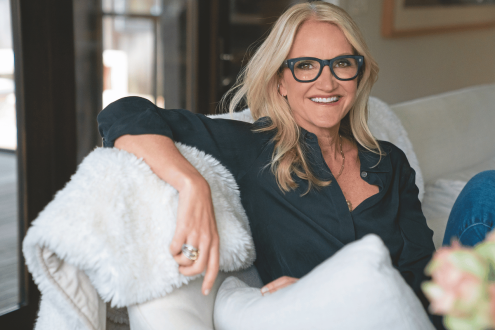Accept your family
The key to harmonious family gatherings lies not in changing the way others behave, but in taking a more realistic view of them. By Hélène Fresnel

We all dream of family gatherings that are comforting and life-affirming. But sometimes it takes only one little thing – a comment, a look – and suddenly we’re a child again, spoiling for a fight. While some look forward to family gatherings, for others, they’re a nightmare. ‘The idea of sitting across the table from my brother, whom I hate, and next to my mother, who can’t stop criticising my hair and clothes, turns my stomach,’ says Juliet, 32. ‘Often, by the middle of Sunday lunch the only thing I want to do is rip off the tablecloth so the roast lands on the “really rather beautiful” Kilim rug Mum and Dad brought back from their last “marvellous, romantic trip” to Istanbul.’
Why this urge to blow up? Why this burning need to have it out, to confront our sister or father about how they ruined what should have been the best years of our life?
‘During these get-togethers, we have to relate both to the family we’ve acquired as adults and, more importantly, to the people we shared our childhood with,’ explains family therapist Nichole Prieur. ‘Inevitably we regress, and unresolved issues from the past come to the surface.’
Different aspects of our identity and our past collide. It only takes a passing remark or a look, and the adult we’ve become disappears behind the unhappy child we once were. Louise, 38, a successful vet, married with two children, suddenly reverts to the ‘difficult’ little girl, third of four children, who had to compete for the attention of an absent father, and who felt picked on by her older sisters. ‘There was one time we were all together,’ she says, ‘my parents, three sisters and me, at the family home for a long weekend. The adults were sitting together, watching our children eating. All of a sudden, my elder sister Victoria criticised the way I was speaking to my son. I don’t know what came over me. I attacked her, screaming that she had no right to criticise me, that I was more grounded than she was and that I was fed up of her interfering. We had a furious row in front of the children, our two other sisters and my dumbfounded parents.
‘Of course I just ended up looking deranged to my whole family. Nothing had changed and once again I felt unappreciated and so much less loved or lovable than Victoria.’
Louise feels she was re-enacting a scenario she had thought belonged to the distant past. Why did it happen? In our psyche there are permanent traces of our family bonds and, more particularly, those that tie us to our parents, our first great love. We wait and hope they will recognise our true worth. ‘It’s the first bond we make,’ explains psychoanalyst Marie-Hélène Brousse. ‘Whatever takes place in the outside world, our fathers and mothers are a part of us’.
Louise wanted to get even, to redress past wrongs. Impossible, say psychoanalysts. Because in reality, our parents are never how we imagine them. We try to settle scores, not with real people, but with the actors from the family saga we’ve written in our own minds. Sigmund Freud, and the psychoanalyst Melanie Klein, noticed it first. When you meet them in the flesh, the heroes of real-life stories bear no resemblance to the descriptions given by patients on the psychiatrist’s couch.
Psychologist and family therapist Éric Trappeniers says: ‘When I listen to my patients’ family members, I get the impression they’ve never lived under the same roof. Each one has their own take. It’s a mistake to think that we all have the same version of a family story’.
We rarely share the same memories or the same perceptions of each other’s behaviour. Anthony, 36, tried to confront his father about his behaviour. ‘He abandoned us all, my mother, my sister and me, when I was three years old. He tried to find loads of good reasons for being unable to take care of us, but I wasn’t having it. I told him, “No, that’s not true, you’re lying”.’ But arguing was pointless. ‘My father had absolutely no interest in listening to anybody else’s version of events. I’d have liked him to be different, and I tried to make him see himself as others saw him. I wanted to tell him some home truths. In the end, I gave up.’
After many arguments Anthony ended up distancing himself from his father. Today, he sees him very rarely.
So should we keep our thoughts to ourselves and give up the idea of setting everyone straight? Not necessarily. We can’t change the person we’re speaking to, but we can get them to understand our point of view.
‘We don’t project ourselves onto a blank screen,’ says Trappeniers. ‘It can be useful to be frank with your parents and tell them, “I had a bad experience of that event, it hurt me”. But if you want to be heard, you need to think before you speak, and avoid being vindictive.’ Laying blame at the right door for past wrongs is a necessary stage in moving on that can’t be avoided. However, criticism is often given in the style of an adolescent rant.
‘While we want our parent to know he or she has let us down, we’re the needy ones,’ says Brousse. ‘And our comments, fed by destructive urges, show a need to test the strength of our family ties.’ On the whole, it’s better to deal with the images of our parents in our minds. ‘If we wash our dirty linen in front of the whole family, it’ll never be clean,’ Trappeniers says. ‘Much better to deal with it in therapy.’
When we’ve processed it in our minds, we’ll be able to say, it won’t happen again. Not because we’re expecting anything to have changed, but because we don’t want it to happen again. ‘Ideally, we reach the point where we can tell ourselves that our parents did the best they could and our brothers and sisters are who they are. The only way to free ourselves from our parents is to give up taking their expectations into account. The day we reach that point, our perception of reality will change by itself. And it will be us who have changed. We will be free.’









